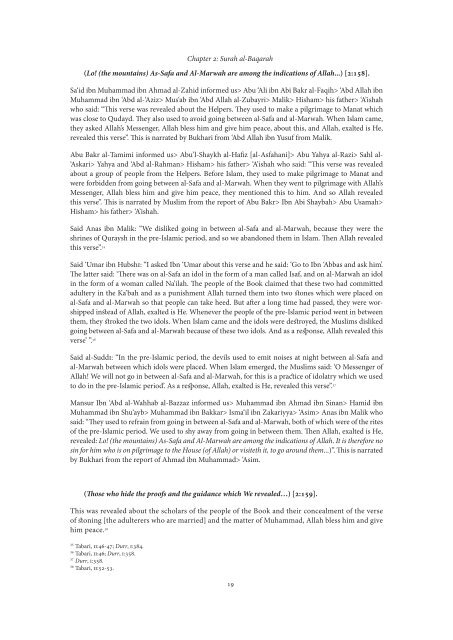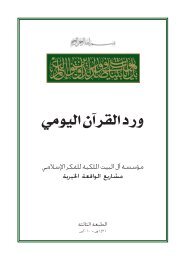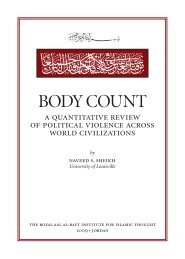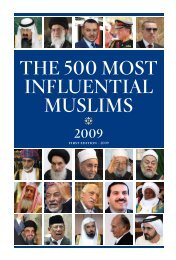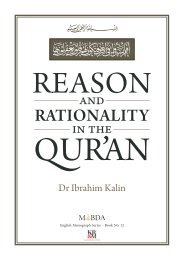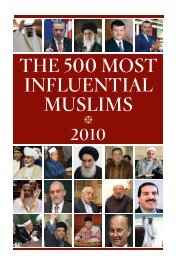Al-W¥^idÏ's Asb¥b al-Nuz‰l - The Royal Islamic Strategic Studies ...
Al-W¥^idÏ's Asb¥b al-Nuz‰l - The Royal Islamic Strategic Studies ...
Al-W¥^idÏ's Asb¥b al-Nuz‰l - The Royal Islamic Strategic Studies ...
You also want an ePaper? Increase the reach of your titles
YUMPU automatically turns print PDFs into web optimized ePapers that Google loves.
Chapter 2: Surah <strong>al</strong>-Baqarah<br />
(Lo! (the mountains) As-Safa and <strong>Al</strong>-Marwah are among the indications of <strong>Al</strong>lah...) [2:158].<br />
Sa‘id ibn Muhammad ibn Ahmad <strong>al</strong>-Zahid informed us> Abu ‘<strong>Al</strong>i ibn Abi Bakr <strong>al</strong>-Faqih> ‘Abd <strong>Al</strong>lah ibn<br />
Muhammad ibn ‘Abd <strong>al</strong>-‘Aziz> Mus‘ab ibn ‘Abd <strong>Al</strong>lah <strong>al</strong>-Zubayri> M<strong>al</strong>ik> Hisham> his father> ‘A’ishah<br />
who said: “This verse was reve<strong>al</strong>ed about the Helpers. <strong>The</strong>y used to make a pilgrimage to Manat which<br />
was close to Qudayd. <strong>The</strong>y <strong>al</strong>so used to avoid going between <strong>al</strong>-Safa and <strong>al</strong>-Marwah. When Islam came,<br />
they asked <strong>Al</strong>lah’s Messenger, <strong>Al</strong>lah bless him and give him peace, about this, and <strong>Al</strong>lah, ex<strong>al</strong>ted is He,<br />
reve<strong>al</strong>ed this verse”. This is narrated by Bukhari from ‘Abd <strong>Al</strong>lah ibn Yusuf from M<strong>al</strong>ik.<br />
Abu Bakr <strong>al</strong>-Tamimi informed us> Abu’l-Shaykh <strong>al</strong>-Hafiz [<strong>al</strong>-Asfahani]> Abu Yahya <strong>al</strong>-Razi> Sahl <strong>al</strong>-<br />
‘Askari> Yahya and ‘Abd <strong>al</strong>-Rahman> Hisham> his father> ‘A’ishah who said: “This verse was reve<strong>al</strong>ed<br />
about a group of people from the Helpers. Before Islam, they used to make pilgrimage to Manat and<br />
were forbidden from going between <strong>al</strong>-Safa and <strong>al</strong>-Marwah. When they went to pilgrimage with <strong>Al</strong>lah’s<br />
Messenger, <strong>Al</strong>lah bless him and give him peace, they mentioned this to him. And so <strong>Al</strong>lah reve<strong>al</strong>ed<br />
this verse”. This is narrated by Muslim from the report of Abu Bakr> Ibn Abi Shaybah> Abu Usamah><br />
Hisham> his father> ‘A’ishah.<br />
Said Anas ibn M<strong>al</strong>ik: “We disliked going in between <strong>al</strong>-Safa and <strong>al</strong>-Marwah, because they were the<br />
shrines of Quraysh in the pre-<strong>Islamic</strong> period, and so we abandoned them in Islam. <strong>The</strong>n <strong>Al</strong>lah reve<strong>al</strong>ed<br />
this verse”. 35<br />
Said ‘Umar ibn Hubsh: “I asked Ibn ‘Umar about this verse and he said: ‘Go to Ibn ‘Abbas and ask him’.<br />
<strong>The</strong> latter said: ‘<strong>The</strong>re was on <strong>al</strong>-Safa an idol in the form of a man c<strong>al</strong>led Isaf, and on <strong>al</strong>-Marwah an idol<br />
in the form of a woman c<strong>al</strong>led Na’ilah. <strong>The</strong> people of the Book claimed that these two had committed<br />
adultery in the Ka’bah and as a punishment <strong>Al</strong>lah turned them into two stones which were placed on<br />
<strong>al</strong>-Safa and <strong>al</strong>-Marwah so that people can take heed. But after a long time had passed, they were worshipped<br />
instead of <strong>Al</strong>lah, ex<strong>al</strong>ted is He. Whenever the people of the pre-<strong>Islamic</strong> period went in between<br />
them, they stroked the two idols. When Islam came and the idols were destroyed, the Muslims disliked<br />
going between <strong>al</strong>-Safa and <strong>al</strong>-Marwah because of these two idols. And as a response, <strong>Al</strong>lah reve<strong>al</strong>ed this<br />
verse’ ”. 36<br />
Said <strong>al</strong>-Sudd: “In the pre-<strong>Islamic</strong> period, the devils used to emit noises at night between <strong>al</strong>-Safa and<br />
<strong>al</strong>-Marwah between which idols were placed. When Islam emerged, the Muslims said: ‘O Messenger of<br />
<strong>Al</strong>lah! We will not go in between <strong>al</strong>-Safa and <strong>al</strong>-Marwah, for this is a practice of idolatry which we used<br />
to do in the pre-<strong>Islamic</strong> period’. As a response, <strong>Al</strong>lah, ex<strong>al</strong>ted is He, reve<strong>al</strong>ed this verse”. 37<br />
Mansur Ibn ‘Abd <strong>al</strong>-Wahhab <strong>al</strong>-Bazzaz informed us> Muhammad ibn Ahmad ibn Sinan> Hamid ibn<br />
Muhammad ibn Shu‘ayb> Muhammad ibn Bakkar> Isma‘il ibn Zakariyya> ‘Asim> Anas ibn M<strong>al</strong>ik who<br />
said: “<strong>The</strong>y used to refrain from going in between <strong>al</strong>-Safa and <strong>al</strong>-Marwah, both of which were of the rites<br />
of the pre-<strong>Islamic</strong> period. We used to shy away from going in between them. <strong>The</strong>n <strong>Al</strong>lah, ex<strong>al</strong>ted is He,<br />
reve<strong>al</strong>ed: Lo! (the mountains) As-Safa and <strong>Al</strong>-Marwah are among the indications of <strong>Al</strong>lah. It is therefore no<br />
sin for him who is on pilgrimage to the House (of <strong>Al</strong>lah) or visiteth it, to go around them...)”. This is narrated<br />
by Bukhari from the report of Ahmad ibn Muhammad> ‘Asim.<br />
(Those who hide the proofs and the guidance which We reve<strong>al</strong>ed…) [2:159].<br />
This was reve<strong>al</strong>ed about the scholars of the people of the Book and their conce<strong>al</strong>ment of the verse<br />
of stoning [the adulterers who are married] and the matter of Muhammad, <strong>Al</strong>lah bless him and give<br />
him peace. 38<br />
35<br />
Tabari, :46-47; Durr, :384.<br />
36<br />
Tabari, :46; Durr, :358.<br />
37<br />
Durr, :358.<br />
38<br />
Tabari, :52-53.<br />
19


